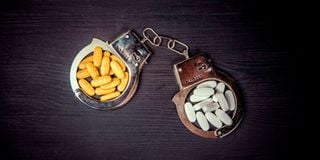Addiction to prescription medicine is as dangerous as drug abuse, learn more

Side effects of using stimulants include insomnia, dizziness, feeling high, restlessness, and anxiety.
What you need to know:
- Understanding how certain medications affect your thinking or behaviour will help you recognise abuse before any adverse effects occur.
The sooner someone gets professional help for their addiction, the better chance they have at getting back into a healthy lifestyle that does not involve abusing drugs.
Prescription drug abuse happens when a person uses prescription medication in ways that the doctor does not instruct. This can include taking more than one dose at a time, using medication for non-medical purposes like to get high, and sharing your medication with others.
The most abused medications include opioids (painkillers), benzodiazepines (anti-anxiety or sleep medicines), and stimulants (to treat ADHD).
When people take prescription medications without permission, they are stealing from the doctor's care. In addition, prescribed drug abuse can lead to addiction, overdose, and even death.
Factors that trigger abuse
- For teens and young adults, the abuse is caused by peer pressure and the urge to feel high or to experiment. This can lead to addiction which is exceedingly difficult to stop without professional help.
- If a person has several health issues simultaneously, they are more likely to abuse or become addicted to drugs.
- Another group of people prone to drug abuse is those with mental health issues, especially if it is undiagnosed. The drugs help them alleviate the symptoms of their condition, making them feel better overall. However, they can become addicted to these drugs.
Commonly abused prescribed drugs
Opioids
Opioids provide relief to those who suffer from pain but can lead to addiction if abused. The feeling of euphoria that comes with abusing opioids causes people to develop an addiction and become dependent on them.
The psychological effects include.
- Euphoria
- Dizziness
- Confusion
- Drowsiness
- Constipation
- Vomiting
- Seizure
- Laboured breathing
- Nausea
When opioids are abused, the effects can be assertive and even fatal. In addition, there is an elevated risk for overdose both because people take multiple doses at once or mix it with other types of medication, which increases depressive symptoms that lead to death if not treated right away.
The most frequently abused opioids include Codeine, fentanyl, morphine
Sedatives
Benzodiazepines are used as sedatives or tranquilizers for those who suffer from anxiety or panic attacks but can be dangerous if abused. In addition, they cause drowsiness and dizziness, which makes it easy to overdose. Unfortunately, people can become addicted to these drugs.
Other side effects of using sedatives include confusion, memory problems, slowed breathing, and difficulty walking.
Commonly abused benzodiazepines include Xanax (alprazolam), Valium (diazepam)
Stimulants
Stimulants prescribed for ADHD provide relief from hyperactivity or sleep disorder symptoms, which can be addictive if they are not taken the way a doctor prescribes them. The danger lies in mixing these drugs with other substances like alcohol.
The signs of stimulant abuse include:
- Headaches
- Loss of appetite
- Irritability
- Rapid breathing Nausea
- Dependency
Other side effects of using stimulants include insomnia, dizziness, feeling high, restlessness, and anxiety.
Commonly abused stimulant medications are Adderall (amphetamine/dextroamphetamine) and Ritalin (methylphenidate).
Ways to prevent addiction
- For parents who have a child or teenager, be involved in their lives and try to understand why they are abusing certain medications. For example, there might be changes in their bodies, leading them to turn to drugs for comfort instead of opening up about what is bothering them.
- The best way to avoid prescription drug abuse is to keep the medications in a safe place away from the reach of children.
- Do not share prescription drugs with another person.
- Always follow the dosage as prescribed by the doctor
- Avoid self-prescription
- Read the side effects of a drug before taking it.
- Do not mix medication without consulting a doctor.
Treating the addiction
- Seek professional help. If a friend or someone close is addicted, encourage them to seek help.
- Learn healthy ways of coping with stress and problems.
- Behaviour change, especially for teens and young adults, will play a key role in getting over the addiction.



